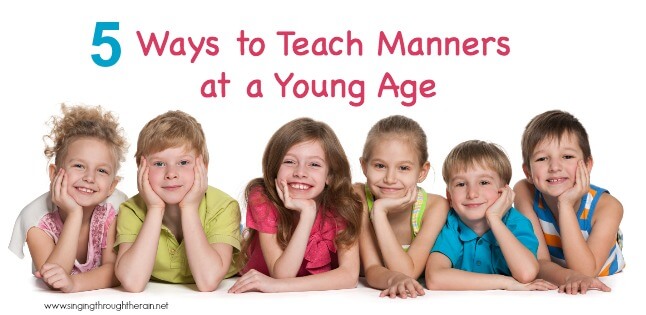5 Ways to Teach Manners at a Young Age
Note: I may earn money or products from the companies, products, or links mentioned in this post.
Manners may not be a priority for every family, but in our family manners are important. I want my kids growing up to be polite, well-mannered, and respectful. My son is only four years old, but so far I have gotten a lot of complaints on how polite and well-mannered he is. I plan to do the same things with my daughter.
SergiyN | Dollar Photo Club
5 Ways I Taught my Son Manners:
1. Sign Language
Some of the first signs I taught my son were “please” and “thank you.” “Please” was an easy one for him and helped him communicate, and “thank you” came later. Even as he got older and still had a hard time talking due to his autism and apraxia of speech, he still would sign “please” and “thank you.” It made me proud to know that even with speech problems he was still being polite!
If you’re looking to teach signing to help your child learn manners at a young age, check out this post for a few tips: How to Involve the Whole Family in Baby Signing.
2. “Repeat After Me.”
In our house, we would make my son repeat “please” or “thank you” when he wanted something or after we gave him something. He would say, “I want milk!” I would say, “May I please have some milk?” and he would then repeat it after me. We are currently still working on this one!
Other times we would ask him, “What do you say?” after he said “I want” something. He would not get that item until he had said please and thank you. Once he started to realize he was not going to get what he wanted without being polite, it made him start saying it more often.
3. Reminders, Reminders, Reminders!
Children are young and it’s hard to always remember to say “please” and “thank you.” I would make sure that I was always there to remind my son to say “please” and “thank you” at every turn. Even if it was something small, even if it was just at home, I would always remind him: “What do you say?” and if he didn’t remember I would prompt him and have him repeat after me.
Reminding your kids a lot can get frustrating, but eventually it will become a habit for them. Before you know it they will be saying “please” and “thank you” even when you aren’t there to remind them!
4. “Excuse You!”
After burping or passing gas, my son would giggle. I would say, “Excuse you!” to teach him that we say “Excuse me.” after these two occurances. I would also follow the above tips in this situation as well. He still giggles, but now he knows that he says, “Excuse me” if one of these occur.
I also would remind my husband that it is our job to set the example in our house. If we want our kids to be polite outside the house then we must practice manners inside the house. This meant that my husband and I would say sexcuse me after burping as well.
5. Set the Example: Miss, Mr., and Mrs.
I was raised that we never called any adult by their first name. Sometimes I still call older or elderly people Mr. or Mrs. It just feels so much more respectful to me. I want my kids to be raised the same way. We make sure they call everyone Miss, Mr., or Mrs. and their last name. Sometimes it’s hard for the kids to remember or to say long names, but we just have them do the best they can at this point.
The best way to do this is to set the example. I don’t use adults first names when I am talking to my kids, I says Miss, Mr., and Mrs. so that they hear it, know how to properly do it, and I am setting an example. For example, I might tell my son we are going to someone’s house for a playdate. I would say, “Today we are going to Miss Ashley’s house to play.” Even though Ashley is my friend I refer to her as “Miss” around my kids.
Bonus Tip: Interrupting
I recently came across this article about teaching your kids not to interrupt. I have been looking for a good way to teach this and I am definitely going to be using this tip. I thought I would share: Teach Your Child Not to Interrupt in One Simple Step.
I am happy to be teaching my kids manners at a young age. There are so many stories I could tell you of my son’s growing politeness, but I will just give you this one example.
The other day I was giving my son his medicine for an eye infection he had. When I was done he said, “Thank you for putting glue in my eye!” It was eye ointment, but to him it apparently felt like glue. It made me happy in a way, because even though I was giving him something he hdid not like, he remembered to thank me because he knew it would help him and make him feel better.
Not only will it make you feel good to hear your kids using manners, but your kids will be grateful you taught them to be polite as well. It will train them for better life experiences!
What do YOU do to teach your kids manners?







I love the suggestion for not interrupting! I will be trying this right away for my 5 year old and perhaps even my older kids. Hopefully it isn’t too late! I’ll let you know.
Nancy